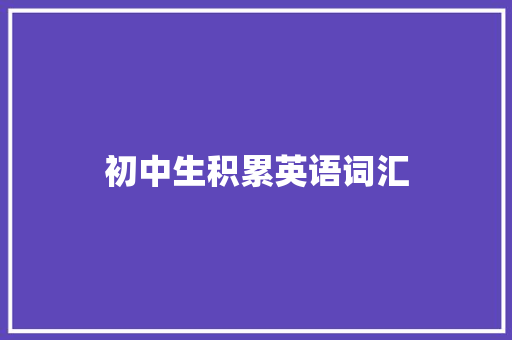In the world of language, words are the building blocks of communication. For junior high students, expanding their vocabulary is not only essential for academic success but also for personal growth. A rich vocabulary enables students to express themselves more effectively, understand complex texts, and engage in meaningful conversations. This article will delve into the importance of vocabulary building, provide practical strategies, and highlight the benefits of a diverse lexicon.
The Importance of Vocabulary Building
As students transition from elementary to junior high, the complexity of the subjects they study increases significantly. A strong vocabulary is crucial for comprehending and mastering these new concepts. According to a study by the National Council of Teachers of English (NCTE), a robust vocabulary is linked to improved reading comprehension and critical thinking skills. It allows students to analyze texts critically, identify themes, and make inferences.
Practical Strategies for Vocabulary Building

1. Read Regularly: Reading is one of the most effective ways to expand vocabulary. Encourage students to read a variety of genres, from novels to non-fiction books, to expose themselves to new words and phrases. Additionally, reading widely exposes students to different writing styles and contexts, which can enhance their understanding of word usage.
2. Use a Dictionary and Thesaurus: Encourage students to use dictionaries and thesauruses to look up unfamiliar words. This not only helps them understand the meaning of new words but also provides synonyms and antonyms, which can be used to enrich their writing and speaking.
3. Annotate Texts: When reading, students should make notes of new words and phrases they encounter. Writing down these words and using them in sentences helps reinforce their memory.
4. Word Games: Engaging in word games such as Scrabble, crossword puzzles, or word searches can be an enjoyable way for students to learn new words.
5. Mind Mapping: Mind mapping can be a powerful tool for organizing and visualizing vocabulary. Students can create a mind map for a particular theme or topic, including related words, definitions, and examples of usage.
Benefits of a Diverse Lexicon
1. Enhanced Communication: A wide range of vocabulary allows students to express their thoughts and ideas more precisely and effectively. This can lead to better communication in both academic and social settings.
2. Improved Writing Skills: A rich vocabulary is the foundation of good writing. It enables students to write more vividly, persuasively, and creatively.
3. Better Understanding of Complex Texts: With a diverse lexicon, students are better equipped to understand and analyze complex texts, including literature, scientific articles, and historical documents.
4. Increased Confidence: Knowing that they can express themselves well through words can boost students' confidence in their abilities, which can have a positive impact on their overall academic performance.
In conclusion, the power of words cannot be overstated. For junior high students, building a strong vocabulary is not just about learning new words; it's about becoming more effective communicators, better learners, and more confident individuals. By employing practical strategies and recognizing the benefits of a diverse lexicon, students can embark on a journey of lifelong learning and language mastery. As the saying goes, \